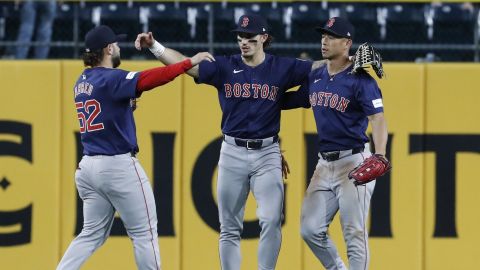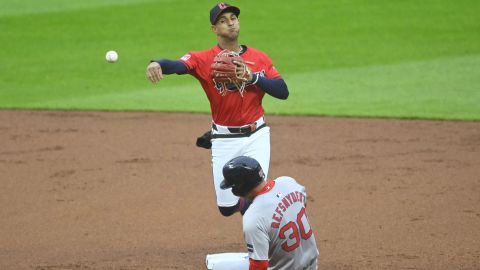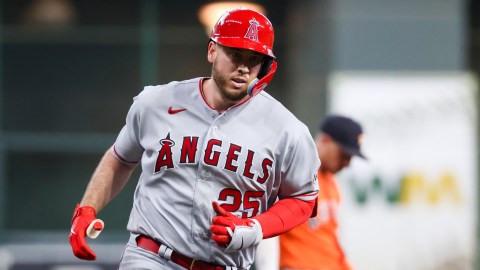What we learned last year was that Cy Young Award voters are not neanderthals, guided solely by win totals and ERA and nothing else. If you’re absolutely dominant (like Felix Hernandez was) and your offense is absolutely putrid (Seattle finished dead last in runs scored), you can still gain recognition from the voters as the best pitcher in the land.
King Felix’s award no doubt represented a major shift in baseball philosophy, as his 13 wins were the fewest of any full-time stater to win the award in a full season. That ideological change may aid Josh Beckett in his run at an AL Cy Young this year, but it’s going to be a lot more difficult.
First things first: Beckett is a top-of-the-line candidate to take home the award as the best pitcher in the American League. He’s second in ERA with a 2.12 mark in 18 starts. He’s struck out an even 100 batters and walked just 33. He leads the league with a 0.89 WHIP. The Red Sox are 13-5 when he pitches. It was all on display Sunday night on national television, when he allowed just one hit over eight innings while striking out six and walking zero Rays.
So why might Beckett have trouble keeping up with Jered Weaver, Justin Verlander, CC Sabathia and others who will receive heavy Cy Young attention over the next couple of months? That would be the ever-complex issue of wins.
Beckett has just eight of them, which puts him in a tie for 14th with 13 other AL pitchers. That’s not exactly standout-type stuff, but as has been very clear over the past three-plus months, very little of that is Beckett’s fault.
Consider this: Beckett has allowed zero or one runs in 10 of his 18 starts, and in those starts he’s lasted an average of seven innings. He picked up wins in just six of them.
While BBWAA writers are smart enough to recognize when a pitcher isn’t getting much help from his offense, the numbers aren’t currently obvious enough for them to feel any sympathy for Beckett. Last year, Hernandez had the lowest run support in the league, with the Mariners scoring an average of 3.75 runs to support him.
This year with Beckett, it’s a bit of a different story, as the Red Sox lead the majors in runs scored by a healthy margin. Beckett only has the 16th-lowest run support average in the league, with the Sox scoring an average of 5.22 runs behind him. That number, however, is skewed quite a bit due to a handful of games. Last Friday, the Boston bats scored eight runs in the bottom of the first against Baltimore. On June 9, they plated seven in the seventh inning against New York. Not surprisingly, he picked up two of his eight wins in those games. You could also consider June 4, when Beckett pitched one of his more average games of the year (6 IP, 4 H, 3 BB, 3 ER) as his offense scored six runs behind him.
On the other side of things, the Sox were shut out in two of Beckett’s starts. Two of his losses came in 3-1 and 3-0 games. In Beckett’s seven no-decisions, the Red Sox have outscored opponents by an average of just 3.86 to 3.43. He’s left the game with his team trailing just four times all season, and he took the L in three of them. In other words, he’s only been saved by his teammates from picking up a loss once all season. In contrast, he earned no decisions in three games in which he left with the Red Sox leading. Four times, Beckett has left a tie game, and he picked up a win in just one of them (July 3 against the Astros). He’s pitched well enough to be 12-4, but instead, he’s 8-3.
Add it all up, and though your eyes (and the majority of measurable statistics) are telling you that Beckett is absolutely spectacular this season, he still doesn’t have the W’s.
Again, while last season proved that voters can see beyond the win column, one award doesn’t change everything. Yes, Hernandez won the award last year, but we’re only three years removed from Daisuke Matsuzaka finishing in fourth place despite some truly average numbers. He pitched just 167 2/3 innings, good enough for 39th in the league. The lack of innings pitched didn’t prevent him from leading the AL in walks with 94. He had a 1.32 WHIP — 24th-best in the AL. He wasn’t much of a strikeout pitcher, either, with just 154, ranking him 15th among his AL peers (in fairness, his 8.27 K/9 rate was fifth-best).
Yet, in the most traditional of traditional pitching statistics, Daisuke shined with an 18-3 record and 2.90 ERA. Anyone who watched Matsuzaka pitch that year could have found a few dozen adjectives to describe the righty before arriving at “dominant” or “masterful,” yet the voters, many of whom cover other teams full time and don’t have the benefit of watching every game, saw the W’s and the ERA and gave him votes.
Matsuzaka didn’t win the award that year — not even close, actually — but the fact that a pitcher could have such an ordinary season and still garner Cy Young attention proves that baseball is not yet in a Brave New World when it comes to award voting. The traditional statistics, as misleading as they can sometimes be, will always carry a certain value to many voters.
That’s evident in ESPN.com’s Cy Young Predictor, which takes into account past results in Cy Young voting and currently has Beckett ranked sixth. He’s behind Dan Haren and C.J. Wilson, both of whom have higher ERAs but have already hit double digits in W’s.
As it stands right now, Beckett is not the clear-cut favorite to win the award. That may be a three-man battle between Sabathia, Verlander and Weaver, and it very well could still be the case come late September. Yet if Beckett continues on his current run but isn’t among the league leaders in wins, it’s very possible he’ll unfairly find himself out of the discussion.



